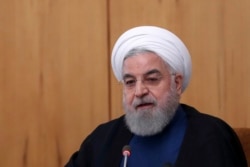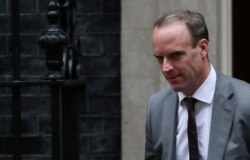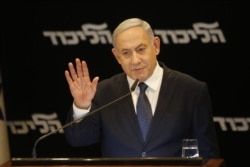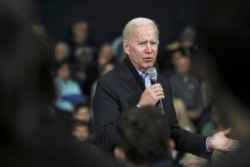The U.S. killing of Iran's top general has elicited calls for restraint and retaliation from global powers and warnings that the world has suddenly become a more dangerous place.
U.S. President Donald Trump sought to justify the killing of General Qassem Soleimani, the leader of Iran's elite Quds Force, in a late Thursday airstrike at Baghdad's airport, tweeting early Friday that Soleimani "has killed or badly wounded thousands of Americans over an extended period of time, and was plotting to kill many more."
In an interview with CNN, U.S. Secretary of State Mike Pompeo also defended the killing, saying the general was planning an "imminent" attack in the Middle East region "that would have put dozens, if not hundreds, of American lives at risk."
Pompeo did not say when or where the attack was expected to take place.
While tens of thousands of people protested in the streets of Iranian cities, including Tehran, where many chanted "Death to America," Iranian President Hassan Rouhani described Soleimani's killing as a "heinous crime" and warned that "the great nation of Iran will take revenge."
In addition to the possibility of some type of retaliation from Iran against U.S. interests in the region, developments stemming from the assassination could spiral into a far larger conflict.
Such concerns were expressed by several permanent member nations of the U.N. Security Council, including France, Russia, China and Britain.
Increasing danger
"We are waking up in a more dangerous world," French Deputy Minister for Foreign Affairs Amelie de Montchalin told RTL radio. "Military escalation is always dangerous. When such actions, such operations, take place, we see that escalation is underway."
Russia's Foreign Ministry condemned Soleimani's killing as a "reckless step" that risked "regional peace and stability" in the Middle East.
The ministry also openly questioned the Trump administration's understanding of the violent forces it had unleashed, declaring, "Such actions do not create ... solutions to complex problems in the Middle East," but instead spark "a new round of escalation of tensions in the region."
Chinese Foreign Ministry spokesman Geng Shuang said China was "highly concerned" about the assassination and its potential repercussions. He also called on "all parties concerned, especially the United States, to maintain calm and restraint and avoid further escalation of tensions.''
Britain broke ranks with other permanent Security Council members, voicing an understanding of the U.S. killing of Soleimani.
"We have always recognized the aggressive threat posed by the Iranian Quds Force led by Qassem Soleimani," said British Foreign Secretary Dominic Raab. "Following his death, we urge all parties to de-escalate. Further conflict is in none of our interests.''
'Maximum restraint'
U.N. Secretary-General Antonio Guterres said in a statement that he was "deeply concerned with the recent escalation" in the region and called on world leaders to "exercise maximum restraint."
"We cannot afford another war in the Gulf," Guterres said.
The most immediate impact of the attack in the Gulf could be in Iraq, where an emergency session of parliament has been called for Saturday. Deputy Speaker Hassan al-Kaabi said lawmakers would make "decisions that put an end to the U.S. presence in Iraq."
Ordering U.S. military forces out of Iraq would diminish America's influence in the region and make the U.S. troop presence in neighboring Syria more uncertain, some observers said.
But there were signs that Iraq's leadership, which has grappled with Iran's influence in Baghdad for years, might be divided over the removal of U.S. troops. Iraqi President Barham Salih called for "the voice of reason and wisdom to dominate, keeping in mind Iraq's greater interests."
Israel, a staunch U.S. ally, applauded the killing of Iran's top general. Prime Minister Benjamin Netanyahu said Trump "deserves all the credit for acting swiftly, forcefully and decisively" against a commander who was "responsible for the death of American citizens and many other people."
'Treacherous' attacker
Syria, which has not had diplomatic relations with the U.S. since the beginning of the Syrian civil war in 2012, strongly condemned the "treacherous American criminal" who killed Soleimani. It also warned that the attack constituted a "dangerous escalation" in the region.
The European Union called for restraint, with European Council President Charles Michel urging all parties involved to avoid further escalation "at all cost."
The Swiss Foreign Ministry said the charge d'affaires of its embassy in Tehran was summoned Friday to be "informed of Iran's position'' after the airstrike. Switzerland represents American interests in Iran, providing a diplomatic channel between the two countries.
Switzerland also joined the growing number of countries urging both sides to avoid further escalation. Egypt, Turkey and Pakistan called for restraint, with Turkey's foreign ministry warning that all sides would suffer otherwise.
That statement also said Turkey opposed foreign intervention, assassinations and sectarian conflict in the region, while Pakistan's statement called for "respect for sovereignty and territorial integrity.''
Reaction to the killing among U.S. lawmakers was divided along party lines as expected during a period of heightened political polarization in Washington.
U.S. House Speaker Nancy Pelosi, a Democrat, said the strike was conducted "without the consultation" of Congress and risked "provoking further dangerous escalation of violence." She said, "America, and the world, cannot afford to have tensions escalate to the point of no return."
Republican James Inhofe, chairman of the Senate Armed Services Committee, said in a statement late Thursday that "President Trump has been clear all along — the United States will not tolerate Iran spilling American blood, and tonight he followed his words with action."
Call for explanation
Former U.S. Vice President Joe Biden, a current candidate for the 2020 Democratic presidential nomination, was more cautious. While admitting Soleimani "deserved to be brought to justice for his crimes against American troops and thousands of innocents throughout the region," Biden said in a written statement that Trump owed the American people an explanation of the plan to keep American servicemen, diplomats and allies safe at home and abroad.
"I hope the administration has thought through the second- and third-order consequences of the path they have chosen. But I fear this administration has not demonstrated at any turn the discipline or long-term vision necessary — and the stakes could not be higher," he said.
Kirsten Fontenrose, a Middle East expert with the Atlantic Council, an American research organization, said in an interview with VOA that Iran would most likely "respond with a series of strikes that will be phased over time."
She said Iranian strikes were likely in the Gulf region and in "other areas of the world where they have operatives and we have interest," including West Africa and Latin America.









